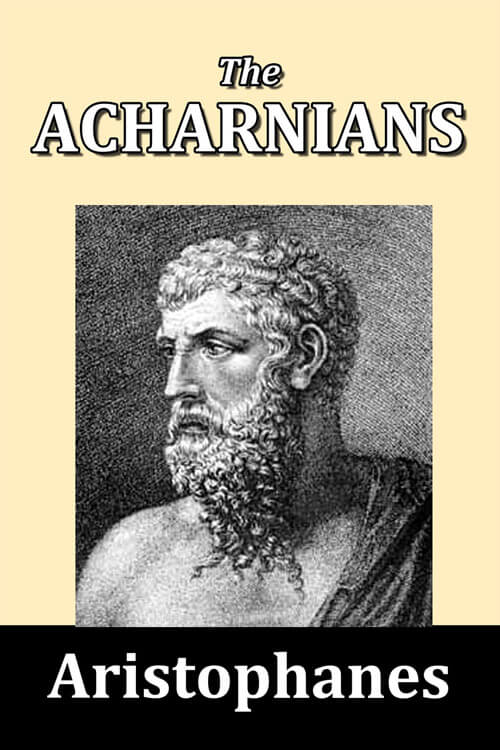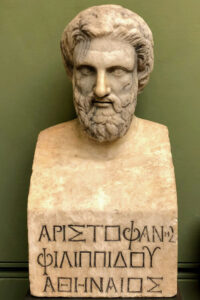
The Acharnians
This is the first of the series of three Comedies—’ The Acharnians,’ ‘Peace’ and ‘Lysistrata’—produced at intervals of years, the sixth, tenth, and twenty-first of the Peloponnesian War, and impressing on the Athenian people the miseries and disasters due to it and to the scoundrels who by their selfish and reckless policy had provoked it, the consequent ruin of industry and, above all, agriculture, and the urgency of asking Peace. To date, it is the earliest play brought out by the author in his name and his first work of serious importance. It was acted at the Lenaean Festival, in January, 426 B.C., and gained the first prize, Cratinus being second.
Its diatribes against the War and fierce criticism of the general policy of the War party so enraged Cleon that, as already mentioned, he endeavored to ruin the author, who in ‘The Knights’ retorted by a direct and savage personal attack on the leader of the democracy.
The plot is the simplest. Dicaeopolis, an Athenian citizen, but a native of Acharnae, one of the agricultural demes and one which had especially suffered in the Lacedaemonian invasions, sick and tired of the ill-success and miseries of the War, makes up his mind, if he fails to induce the people to adopt his policy of “peace at any price,” to conclude a private and particular peace of his own to cover himself, his family, and his estate. The Athenians, momentarily elated by victory and over-persuaded by the demagogues of the day—Cleon and his henchmen, refuse to hear of such a thing as coming to terms. Accordingly, Dicaeopolis dispatches an envoy to Sparta on his account, who comes back presently with a selection of specimen treaties in his pocket. The old man tastes and tries, special terms are arranged, and the play concludes with a riotous and uproarious rustic feast in honor of the blessings of Peace and Plenty.
Incidentally, excellent fun is poked at Euripides and his dramatic methods, which supply matter for so much witty badinage in several others of our author’s pieces.
Another especially comic incidents are the scene where the two young daughters of the famished Megarian are sold in the market at Athens as suck(l)ing-pigs—a scene in which the convenient similarity of the Greek words signifying a pig and the ‘pudendum muliebre’ respectively is utilized in a whole string of ingenious and suggestive ‘double entendres’ and ludicrous jokes; another where the Informer, or Market-Spy, is packed up in a crate as crockery and carried off home by the Boeotian buyer.
The drama takes its title from the Chorus, composed of old men of Acharnae.
Read or download Book
Aristophanes
Aristophanes ( c. 446 – c. 386 BC), son of Philippus and Zenodora, of the deme Kydathenaion (Latin: Cydathenaeum), was a comic playwright or comedy-writer of ancient Athens and a poet of Old Attic Comedy. Eleven of his forty plays survive virtually complete.
Biography.
These provide the most valuable examples of a genre of comic drama known as Old Comedy and are used to define it, along with fragments from dozens of lost plays by Aristophanes and his contemporaries.
Also known as “The Father of Comedy” and “the Prince of Ancient Comedy”, Aristophanes has been said to recreate the life of ancient Athens more convincingly than any other author. His powers of ridicule were feared and acknowledged by influential contemporaries; Plato singled out Aristophanes’ play The Clouds as slander that contributed to the trial and subsequent condemning of the death of Socrates, although other satirical playwrights had also caricatured the philosopher.
Aristophanes’ second play, The Babylonians (now lost), was denounced by Cleon as a slander against the Athenian polis. It is possible that the case was argued in court, but details of the trial are not recorded and Aristophanes caricatured Cleon mercilessly in his subsequent plays, especially The Knights, the first of many plays that he directed himself. “In my opinion,” he says through that play’s Chorus, “the author-director of comedies has the hardest job of all.”
Aristophanes’s name means ‘one who appears best’, from the Greek ‘ἄριστος’ (Aristos) meaning “best” and ‘φαίνομαι’, meaning “appear”.
Less is known about Aristophanes than about his plays. His plays are the main source of information about him and his life. It was conventional in Old Comedy for the chorus to speak on behalf of the author during an address called the parabasis and thus some biographical facts can be found there. However, these facts relate almost entirely to his career as a dramatist and the plays contain few unambiguous clues about his personal beliefs or his private life. He was a comic poet in an age when it was conventional for a poet to assume the role of teacher (didaskalos), and though this specifically referred to his training of the Chorus in rehearsal, it also covered his relationship with the audience as a commentator on significant issues.
Aristophanes claimed to be writing for a clever and discerning audience, yet he also declared that “other times” would judge the audience according to the reception of his plays. He sometimes boasts of his originality as a dramatist yet his plays consistently espouse opposition to radical new influences in Athenian society. He caricatured leading figures in the arts (notably Euripides, whose influence on his work however he once grudgingly acknowledged), in politics (especially the populist Cleon), and in philosophy/religion (where Socrates was the most obvious target). Such caricatures seem to imply that Aristophanes was an old-fashioned conservative, yet that view of him leads to contradictions.
It has been argued that Aristophanes produced plays mainly to entertain the audience and to win prestigious competitions. His plays were written for production at the great dramatic festivals of Athens, the Lenaia, and City Dionysia, where they were judged and awarded prizes in competition with the works of other comic dramatists. An elaborate series of lotteries, designed to prevent prejudice and corruption, reduced the voting judges at the City Dionysia to just five. These judges probably reflected the mood of the audiences yet there is much uncertainty about the composition of those audiences. The theatres were certainly huge, with seating for at least 10,000 at the Theatre of Dionysus. The day’s program at the City Dionysia for example was crowded, with three tragedies and a satyr play ahead of a comedy, but it is possible that many of the poorer citizens (typically the main supporters of demagogues like Cleon) occupied the festival holiday with other pursuits. The conservative views expressed in the plays might therefore reflect the attitudes of the dominant group in an unrepresentative audience.






